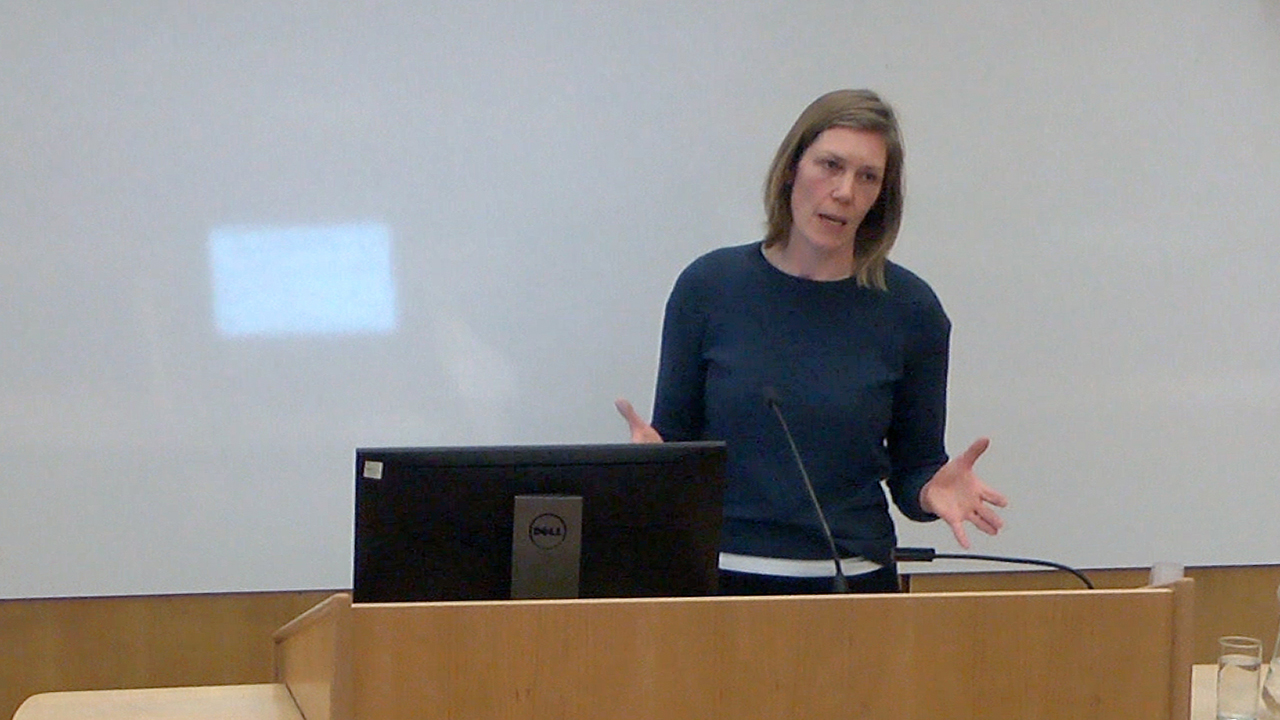'Should parents have the final say on the medical treatment of their children?': The 2019 Baron de Lancey Lecture
Duration: 53 mins 53 secs
Share this media item:
Embed this media item:
Embed this media item:
About this item

| Description: |
Baron Cornelius Ver Heyden de Lancey (1889-1984) was a wealthy and public-spirited Dutchman who at different times in his life was a dentist, doctor, surgeon, barrister and art historian. In 1970 he created the De Lancey and De La Hanty Foundation, to promote studies in medico-legal topics. The Foundation generously gave Cambridge the Ver Heyden de Lancey Fund, which since 1996 has funded occasional public lectures on medico-legal issues of current interest.
The 2019 Baron de Lancey Lecture was delivered by Imogen Goold, Associate Professor in Law at the University of Oxford, on 8 March 2019, and was entitled "Should parents have the final say on the medical treatment of their children?". Imogen Goold is Associate Professor in Law at the University of Oxford, and a Fellow of St Anne's College. She studied Law and Modern History at the University of Tasmania, Australia, receiving her PhD in 2005. Her doctoral research explored the use of property law to regulate human body parts. She also received a Masters degree in Bioethics from the University of Monash in 2005. From 1999, she was a research member of the Centre for Law and Genetics, where she published on surrogacy laws, legal constraints on access to infertility treatments and proprietary rights in human tissue. In 2002, she took up as position as a Legal Officer at the Australian Law Reform Commission, working on the inquiries into Genetic Information Privacy and Gene Patenting. After leaving the ALRC in 2004, she worked briefly at the World Health Organisation, researching the provision of genetic medical services in developing countries. Her research interests include the regulation of IVF, the ownership of human body parts and the impact of artificial intelligence on the law of tort. For more information about the Baron de Lancey Lecture series, please see: http://www.lml.law.cam.ac.uk/events/vhdl-events |
|---|
| Created: | 2019-03-13 12:20 |
|---|---|
| Collection: |
Cambridge Law: Public Lectures from the Faculty of Law
Centre for Law, Medicine and Life Sciences Lectures |
| Publisher: | University of Cambridge |
| Copyright: | Mr D.J. Bates |
| Language: | eng (English) |
| Distribution: |
World
|
| Categories: |
iTunes - Law & Politics - Law |
| Explicit content: | No |
| Aspect Ratio: | 16:9 |
| Screencast: | No |
| Bumper: | UCS Default |
| Trailer: | UCS Default |
| Abstract: | If doctors believe that they might be able to save a dying child, should the parents have the freedom to pursue this treatment? If a court decides that the treatment is not in the child's best interests, should it have unlimited authority to intervene? When deciding what care a child receives, should the wishes of the parents be given any weight? These questions raise complex issues about the boundaries of court power, and how far the state can intervene in what might be considered private, family decisions. They demand we consider the extent to which we give parents the freedom to decide about their children and when this might yield to consideration about the child's welfare. Who knows best? The court? The doctors? The parents? In this talk, Dr Imogen Goold (University of Oxford, Faculty of Law) explores these and related questions about the scope of parental and judicial power. |
|---|---|
Available Formats
| Format | Quality | Bitrate | Size | |||
|---|---|---|---|---|---|---|
| MPEG-4 Video | 1280x720 | 2.98 Mbits/sec | 1.18 GB | View | Download | |
| MPEG-4 Video | 640x360 | 1.94 Mbits/sec | 784.22 MB | View | Download | |
| WebM | 1280x720 | 2.04 Mbits/sec | 826.73 MB | View | Download | |
| WebM | 640x360 | 517.01 kbits/sec | 204.10 MB | View | Download | |
| iPod Video | 480x270 | 520.49 kbits/sec | 205.42 MB | View | Download | |
| MP3 | 44100 Hz | 249.74 kbits/sec | 98.68 MB | Listen | Download | |
| MP3 | 44100 Hz | 62.22 kbits/sec | 24.67 MB | Listen | Download | |
| Auto * | (Allows browser to choose a format it supports) | |||||

